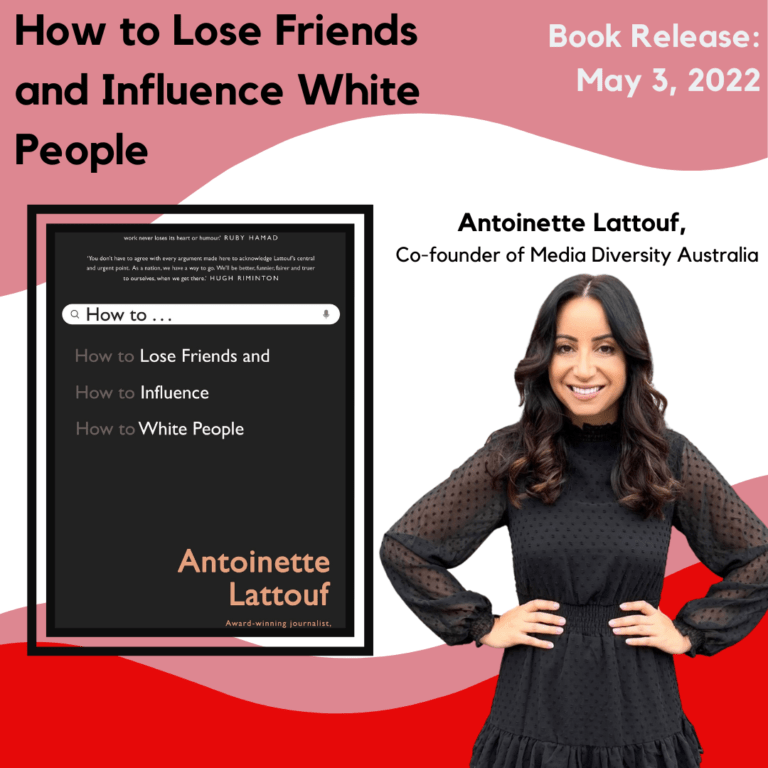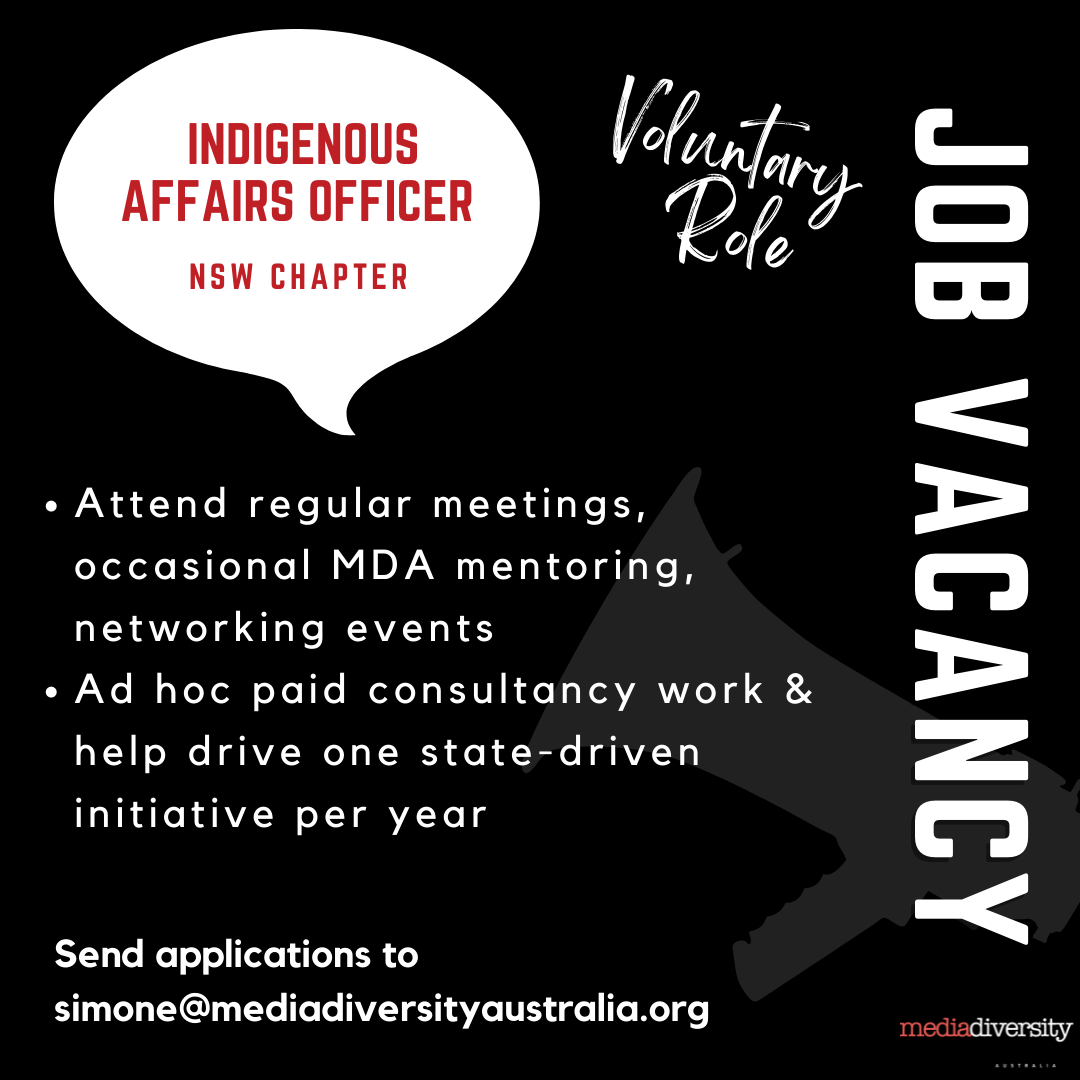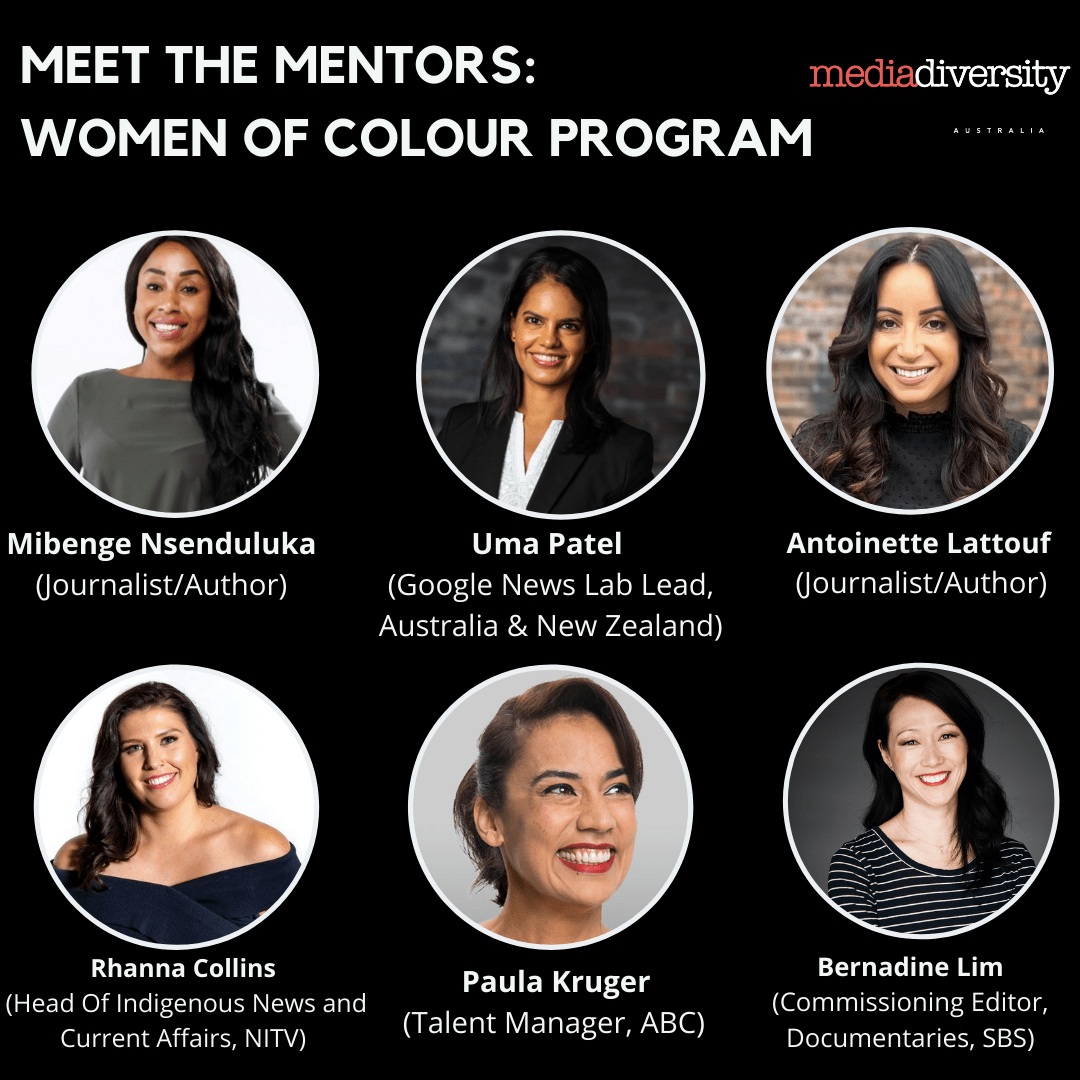Hi MDA supporters,
In this month’s newsletter, in celebration of the first Asian-Australian woman being appointed to the board of an Australian media organisation we put the spotlight on Katrina Rathie, non-executive Director to Special Broadcasting Service. Find launch details and link to purchase MDA Co-founder Antoinette Lattouf’s book How to Lose Friends and Influence White People. We also introduce our upcoming event ‘Without Fear or Favour: How Chinese Australian journalists can cover China safely and fairly’ hosted by Stan Grant. Apply now for MDA’s voluntary Chapter Roles in NSW, VIC and QLD. And finally, meet the mentors for our Women of Colour Mentorship Program.

I am very excited about my new role as a Non-Executive Director of SBS. The appointment was made on 31 March 2022 by the Governor-General on the recommendation of The Hon Paul Fletcher, the Minister of Communications, Urban Infrastructure, Cities & the Arts, and the Morrison Government.
The role of the Board is to decide the objectives, strategies, and policies to be followed by SBS and to ensure that SBS performs its functions in a proper, efficient, and economical manner and with the maximum benefit to the people of Australia.
SBS is usually considered the gold standard when it comes to diversity in the media, but like everything, there’s always room for improvement. I come as a new independent director with fresh eyes and an open mindset. My 5 years on the Advisory Board of MDA have helped me think deeply about diversity issues in the media. As the Australian-born daughter of immigrants, I have lived and learned experiences that I hope to bring to the Board table. I do think that we need to tackle the issue of cultural diversity and racism gently but effectively.
I’d like to see more local stories told about our Indigenous community explaining our history in their words, the importance of the Uluru Statement of the Heart and voice, stories showing diverse women succeeding in sport, stories about migrants who are innovating and running successful businesses, more profiles on our most successful multi-cultural role models and business leaders.
My parents lived in a house next door to the late Kerry Packer – he used to fly the Channel 9 helicopter from Park Street or Palm Beach and land in the backyard next door while I was studying. There were always journalists, television presenters, cricketers, celebrities, and politicians around. The world of television, newspapers, and magazines seemed so incredibly glamorous to me. I dreamed of being a journalist, but Kerry Packer and my Chinese-born father encouraged me to study law. You know the old story of Asian immigrant parents wanting their children to be doctors, lawyers, and professionals. That was me.
I enrolled in Commerce/Law at UNSW Sydney.I won the UNSW Media Law Prize for best student in media law. From there, I went on to work at Stephen Jaques, which became Mallesons Stephen Jaques then King & Wood Mallesons. At the time, I was the first female Asian-Australian to work at an establishment law firm.
In the late 80s, I did the New York Bar and worked for an advertising and media law firm, representing ABC, HBO, and many fabulously creative agencies in a world like Mad Men. After meeting my Australian husband at a New York Met’s game, we returned to Australia and I became the legal columnist for B&T Magazine and started the climb to law firm partnership.
I became a partner at the firm, a position that I held for 25 years, including the last 7 as Partner in Charge of Sydney. I am still the only Asian-Australian to have the privilege of leading a top-tier legal firm in Australia.
Throughout my career, I have been a strong advocate and role model for gender and cultural diversity including serving on the Advisory Board of Media Diversity Australia and NSW Law Society Diversity & Inclusion Committee. I am the NSW Patron of the NSW Asian Australian Lawyers Association, a Judge of the 40 under 40 Asian-Australian Awards, and I sit on the Culture Strategy Committee of Sydney University and the Law Advisory Committee at UNSW Law & Justice.
If you follow and be guided by your passion and purpose, you will be happy. I have ended up being selected for the SBS board because it combines my passion for multiculturalism, media, broadcasting, and digital communications with my skills in law, business, leadership, and governance. It’s a beautiful fit.
To the lawyers, whenever you write something be it an email to a client, a formal cease and desist letter to the other side, an affidavit, or a submission for Court, my litmus test has always been “Would I be proud of what I have written if it ends up on the front page of the Sydney Morning Herald tomorrow morning?” This test has rarely failed me. If you doubt it, keep it in your drafts box and look at it again in the morning.
To the journalists, storytelling is an amazing super-power. Journalism is a courageous and important profession, tell those great stories well and call things out. In investigative journalism, facts, truth, authenticity, and compassion really matter. But always have fun with it – journalism should both educate and entertain.

A guide through the balancing act of activist, advocate, and ally, remembering that just because others are learning you don’t need to be the teacher, from our very own -the dynamic and sharp co-founder of Media Diversity Australia, Antoinette Lattouf.
For those of you who are not familiar with the journey of how MDA was founded, parts of the book are dedicated to telling the story! It is a ground-breaking and honest exploration of the modern manifestations of systemic racism in Australia today, and how we, as a collective, can take steps to make change.
Antoinette Lattouf puts a microscope to the actions of those in a position of influence and holds them accountable while examining what happens to those that dare to challenge white institutions of power.
Without Fear or Favour: how Chinese Australian journalists can cover China safely and fairly. Hosted by Stan Grant, the live event will examine two challenging issues: (1) How Chinese background journalists can cover China-Australia relations given the perceived and real threats of reprisals or attacks on their China-based family or themselves, and (2) How newsrooms can cover China in a way that engages a Chinese diaspora that often have very different opinions on their country of heritage.
The panel on Australian media coverage of China will be held on Tuesday, 31st May 2022 at the Judith Nielsen Institute.
The panelists include Mandi Wicks (News Director, SBS), Jennifer Hsu (Research Fellow, Lowy Institute), Echo Hui (Investigative Journalist, ABC), and Songfa Liu (NEMBC member & President ICMS).
Want to attend the event, Without fear or favour: how Chinese Australian journalists can cover China safely and fairly on 31st May 2022?
Email us at comms@mediadiversityaustralia.org to be added to the invitee list. Please include your preferred name, number, email address and occupation in the body of the email.

QUEENSLAND
Indigenous Affairs Officer to join our Queensland Chapter.
In this voluntary role, you will attend a one-hour meeting each quarter, be available for MDA mentoring when called upon, have the willingness and availability to engage in ad hoc, paid consultancy work (e.g. sharing insight with organisations about matters relating to First Nations issues) and participate in one state-driven initiative per year.
This position will suit an active and experienced reporter or communications professional with a demonstrated understanding of the issues and events that affect First Nations people, a strong network of contacts within First Nations communities across Australia, and an understanding of cultural protocols.
———————————————————————————————————————————————————–
VICTORIA
Disability Affairs Officer to join our Victoria Chapter.
In this voluntary role, you will attend a one-hour meeting each quarter, be available for MDA mentoring when called upon, have the willingness and availability to engage in ad hoc paid consultancy work, and participate in one state-driven initiative per year.
This position will suit an active and experienced reporter or communications professional with a demonstrated understanding of the issues and events that affect persons living with a disability. You should be committed to changing the representation of disability across mainstream media given how influential the industry is in shaping social attitudes.
———————————————————————————————————————————————————–
NEW SOUTH WALES
Secretary to join our New South Wales Chapter.
In this voluntary role, you will attend a one-hour meeting each quarter, be available for MDA mentoring when called upon, have the willingness and availability to engage in ad hoc paid consultancy work and participate in one state-driven initiative per year.
This position will suit an active and experienced reporter or communications professional who is well-organised and will arrange monthly meetings, send out agendas and take minutes.
————————————————————————————————————————————————————
Events Coordinator to join our New South Wales Chapter.
In this voluntary role, you will attend a one-hour meeting each quarter, oversee at least three networking events per year in your state, be available for MDA mentoring when called upon, have the willingness and availability to engage in ad hoc, paid consultancy work and participate in one state-driven initiative per year.
This position will suit an active and experienced reporter or communications professional with a solid roster of industry contacts and a useful amount of, or desire to learn, event planning experience.
————————————————————————————————————————————————————
Indigenous Affairs Officer to join our New South Wales Chapter.
In this voluntary role, you will attend a one-hour meeting each quarter, be available for MDA mentoring when called upon, have the willingness and availability to engage in ad hoc, paid consultancy work and participate in one state-driven initiative per year.
This position will suit an active and experienced reporter with a demonstrated understanding of the issues and events that affect First Nations people, as well as a strong network of contacts within First Nations communities across Australia and an understanding of cultural protocols.
————————————————————————————————————————————————————
APPLICATION DETAILS:
To apply for any of the above positions, please send your resumé and in the body of your email, outline your motivation for applying for the role, why you think you are suitable and why Media Diversity Australia’s mission aligns with your own.

The Women of Colour Mentorships in partnership with Crescent Foundation, University of Melbourne, and Monash University, is designed to empower First Nations and culturally and linguistically diverse women journalists and provide them with the requisite knowledge and skills to navigate climbing the ranks of editorial leadership.
The MENTORS for the Women Of Colour Mentorship Program are as follows:
Mentorships will take place with one mentor connected to one media outlet for the duration of the placement. Once accepted, each applicant will be matched with the right Mentor.
Are you an EARLY to MID career First Nations or culturally and linguistically diverse (CALD) journalist interested in being mentored by senior women in media as you progress into a leadership role? Join our Women Of Colour mentorship program and get a chance to train under these brilliant mentors!
Entries close on May 11th, 2022, 5pm.
Send your mentee applications to MDA’s Director of Special Projects, Simone Amelia Jordan at simone@mediadiversityaustralia.org
More info about the program here: https://www.mediadiversityaustralia.org/opportunities/
As a not-for-profit organisation, we rely on the help of our incredible volunteers. With your financial and volunteer support, we can continue to run programs to support culturally and linguistically diverse journalists, conduct agenda-setting research, run networking events, provide practical solutions for the media industry, and much more. If you would like to make a tax-deductible donation to support the vital work we do, please click here.
Media Diversity Australia (MDA) is a national not-for-profit organisation led by journalists and media professionals. Australia is culturally and linguistically diverse, and our media should be too. Established in 2017, MDA has a unique role as a champion of cultural diversity in Australian journalism and news media. We have a vision for a media industry with full and equal participation for culturally diverse people at all levels.